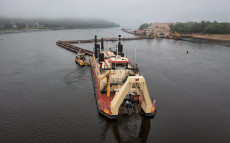- pathfindersAI
- Job Profile
Commercial Divers
Summary
Exploring the Depths: A Career as a Commercial Diver
What They Do
Commercial divers perform a wide variety of tasks underwater. They work in diverse settings, from the depths of the ocean to inland rivers, lakes, and other bodies of water. Their work encompasses a broad spectrum of activities, ranging from underwater construction and welding to the inspection, maintenance, and repair of submerged structures such as bridges, dams, pipelines, and offshore oil rigs. Commercial divers might also be involved in salvage operations, recovering sunken vessels, or assisting in underwater surveys and environmental studies. The essence of a commercial diver's role lies in their ability to apply specialized skills and techniques in an environment that is as challenging as it is fascinating.
Job Responsibilities
The responsibilities of a commercial diver are extensive and varied, demanding a high level of expertise and adaptability. They may involve:
- Inspection and Maintenance: Inspecting submerged structures for signs of wear, corrosion, or damage and performing necessary maintenance or repair work.
- Construction Work: Engaging in underwater construction activities such as welding, fitting, and assembly of structures or components.
- Salvage Operations: Locating and recovering sunken vessels, aircraft, and other items, often requiring complex rigging and lifting operations.
- Environmental Surveys: Conducting environmental assessments and collecting data to support marine biology, archaeology, or other scientific research.
- Safety Measures: Ensuring all safety protocols are followed rigorously to prevent accidents and injuries in the challenging underwater environment.
- Equipment Management: Operating and maintaining diving equipment, such as scuba gear, helmets, or underwater power tools.
Essential Skills
To thrive as a commercial diver, an individual must possess a unique blend of technical and personal skills. Key among these are:
- Technical Proficiency: A deep understanding of diving techniques, underwater welding, and the operation of specialized equipment.
- Physical Fitness: Exceptional physical health and stamina, as the job often requires long hours in physically demanding conditions.
- Problem-Solving Abilities: The capacity to troubleshoot and resolve issues that may arise underwater, often under time constraints.
- Attention to Detail: Precision and care in executing tasks, particularly when safety and the integrity of structures are concerned.
- Effective Communication: Strong communication skills, essential for coordinating with team members and ensuring successful completion of projects.
Educational Pathways
Becoming a commercial diver involves a combination of formal education, specialized training, and practical experience. Typically, aspiring divers should:
- Complete High School Education: A high school diploma or equivalent is foundational, with coursework in physics, mathematics, and biology being particularly beneficial.
- Pursue Diving Certification: Enroll in a commercial diving program approved by recognized bodies, such as the Association of Diving Contractors International (ADCI) or other accredited institutions. These programs offer intensive training in diving techniques, safety procedures, underwater welding, and equipment handling.
- Obtain Additional Certifications: Depending on their area of focus, divers may seek additional certifications, such as underwater welding, hazardous materials handling, or hyperbaric oxygen therapy.
- Gain Experience: Many divers start as tender/assistants, gaining practical experience by supporting seasoned divers before fully taking on diving responsibilities.
Career Prospects
The career prospects for commercial divers are compelling, with opportunities available in various industries. These include:
- Offshore Oil and Gas: A significant number of divers are employed in the oil and gas sector, performing maintenance and inspections of offshore rigs and pipelines.
- Construction and Infrastructure: Divers are vital in the construction and repair of bridges, dams, and other underwater structures.
- Environmental and Scientific Research: Divers assist in marine biology research, underwater archaeology, and environmental impact assessments.
- Public Safety and Salvage: Opportunities exist within emergency response units, law enforcement, and private salvage companies.
With experience, divers can advance to supervisory roles, dive supervisors, or diving operations managers, overseeing projects and teams of divers. There are also opportunities to specialize further or move into related fields, such as diving instruction or consulting.
Conclusion
A career as a commercial diver is both challenging and rewarding, offering a unique blend of adventure and technical expertise. It requires a solid educational foundation, specialized training, and a range of essential skills. With diverse opportunities across several industries, the career prospects for commercial divers are robust and promising. Those drawn to the depths and the intricate world of underwater work will find this career path both fulfilling and fascinating. Whether contributing to major infrastructure projects, supporting environmental research, or engaging in salvage operations, commercial divers play an indispensable role in exploring and managing our underwater world.
Video
Compensation
Similar Occupations
In this area you will find other occupations that are close to the one you were viewing in tasks, knowledge and work environment. If the primary job profile you are viewing isn't quite to your liking, take a look around and see what else is available.
Basic and Premium Accounts have more alternative occupations available than the Free account.

Boilermakers - 47-2011.00
Boilermakers are skilled tradespeople who construct, assemble, maintain, and repair large containers that hold gases or liquids, such as boilers, tanks, and vats. They work with heavy-duty tools and equipment, often in industrial settings, to ensure these structures operate safely and efficiently.
-
$71,140/yr
Median Pay -
11,130
Number of Jobs

Dredge Operators - 53-7031.00
A Dredge Operator is responsible for operating dredging equipment to excavate and remove underwater materials like sand, gravel, and silt from bodies of water such as rivers, lakes, and harbors. Their work ensures navigational channels are clear and often contributes to environmental management and land reclamation projects.
-
$50,440/yr
Median Pay -
940
Number of Jobs